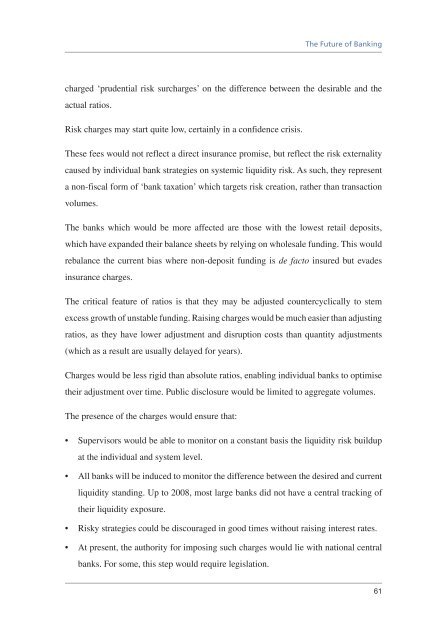Create successful ePaper yourself
Turn your PDF publications into a flip-book with our unique Google optimized e-Paper software.
The Future of Banking<br />
charged ‘prudential risk surcharges’ on the difference between the desirable and the<br />
actual ratios.<br />
Risk charges may start quite low, certainly in a confidence crisis.<br />
These fees would not reflect a direct insurance promise, but reflect the risk externality<br />
caused <strong>by</strong> individual bank strategies on systemic liquidity risk. As such, they represent<br />
a non-fiscal form of ‘bank taxation’ which targets risk creation, rather than transaction<br />
volumes.<br />
The banks which would be more affected are those with the lowest retail deposits,<br />
which have expanded their balance sheets <strong>by</strong> relying on wholesale funding. This would<br />
rebalance the current bias where non-deposit funding is de facto insured but evades<br />
insurance charges.<br />
The critical feature of ratios is that they may be adjusted countercyclically to stem<br />
excess growth of unstable funding. Raising charges would be much easier than adjusting<br />
ratios, as they have lower adjustment and disruption costs than quantity adjustments<br />
(which as a result are usually delayed for years).<br />
Charges would be less rigid than absolute ratios, enabling individual banks to optimise<br />
their adjustment over time. Public disclosure would be limited to aggregate volumes.<br />
The presence of the charges would ensure that:<br />
• Supervisors would be able to monitor on a constant basis the liquidity risk buildup<br />
at the individual and system level.<br />
• All banks will be induced to monitor the difference between the desired and current<br />
liquidity standing. Up to 2008, most large banks did not have a central tracking of<br />
their liquidity exposure.<br />
• Risky strategies could be discouraged in good times without raising interest rates.<br />
• At present, the authority for imposing such charges would lie with national central<br />
banks. For some, this step would require legislation.<br />
61














